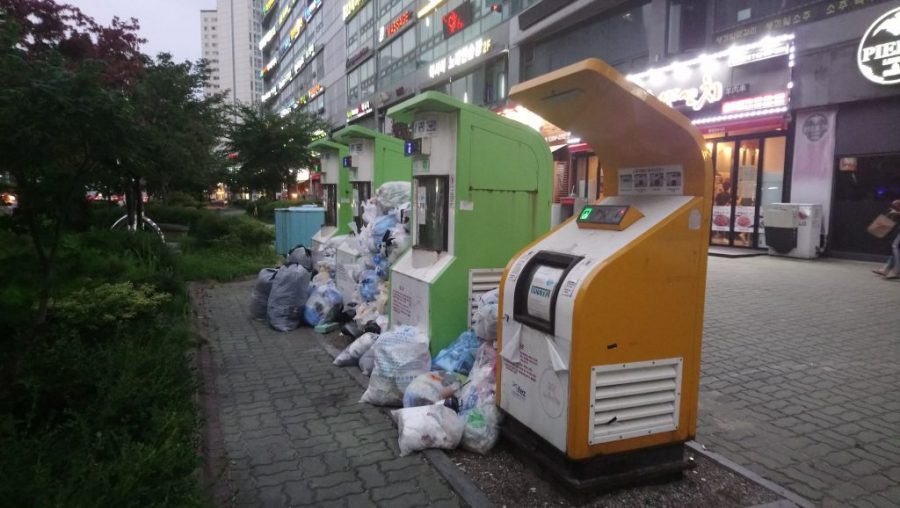Incheon Metropolitan City Announces “Comprehensive Plan for Reducing Waste”
Trash piles up beside trash receptacles in Songdo. Incheon Metropolitan City plans to reduce the amount of trash produced per day by 32 tons before 2025. (Photo Courtesy of Google Images.)
November 4, 2020
Ahead of the end of the use of landfills in the Korean capital area in 2025, the Incheon Metropolitan City will push to reduce household waste starting from next year. On November 3, the Incheon Metropolitan City announced a “Comprehensive Plan for Reducing Waste” that focuses on restricting the use of disposable products and strengthening recycling.
Starting from next year, the Incheon Metropolitan City will ban the use of disposable products and expand the use of eco-friendly products at all public offices to private sectors from 2022. First of all, the Incheon Metropolitan City and the Incheon Metropolitan City’s affiliated public offices will restrict the purchase of disposable products such as disposable cups and replace all disposable products with recycled paper products at meetings and events.
Also, the Incheon Metropolitan City plans to push ahead with the project of “Eco-friendly Funeral Halls without Disposable Products” and test-run them by not using disposable products at the funeral hall of Incheon Medical Center from February 2021.
In addition, the Incheon Metropolitan City plans to reduce food waste to an average of 655 tons per day by distributing Radio Frequency Identification (RFID) quantity based devices to all apartments in Incheon by 2025, which will only cover the same amount of food waste thrown away by each household.
The plan is to continue to distribute food waste reduction devices to households and reduce the daily average of 687 tons of food waste to 655 tons per day by 2025. Starting with Namdong-gu, Bupyeong-gu, and Gyeyang-gu in 2020, the plan will be gradually expanded to enable practical reduction from emission sources.
To verify the effectiveness of the Internet of Things (IoT) that is based on the household waste collection system, the Incheon Metropolitan City will do a pilot installation of IoT-based collecting containers, a new type of closed container, in residential areas from next year. This goes beyond the existing method that collects quantity-based plastic garbage bags every day and is collected when 80 percent of waste is loaded in IoT-based collecting containers, and the payment method is also made by electronic payment methods such as credit cards from existing quantity-based plastic garbage bags.
In 2021, the Incheon Metropolitan City will select appropriate locations such as apartments or general housing, and start installing and doing pilot operations of IoT closed containers. Furthermore, the Incheon Metropolitan City will collect opinions from street cleaners, domestic waste collection and transportation companies, and residents about the operational performance. If the results are good, it will expand the subject areas of installation to shopping malls and tourist attractions from 2022.

